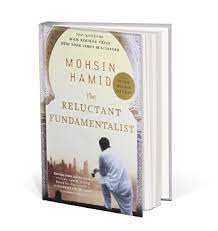Mohsin Hamid’s Deep Dive into Global Consciousness
In an era of literature often concerned with crossing boundaries, both physical and psychological, Mohsin Hamid’s “The Reluctant Fundamentalist” stands out as an exemplar of post-9/11 fiction that delves into the tumultuous intersection of East and West. This captivating monologue takes the reader on a roller-coaster of emotions, from the dizzying heights of the American Dream to the dark alleyways of ideological extremism.

Voice and Structure
One of Hamid’s most compelling choices is to employ a second-person narrative structure. The entire novel unfolds as a one-sided conversation between Changez, the protagonist, and an unnamed American listener. This device serves multiple purposes: it invites readers to become the listening party, thus creating a sense of intimacy, while also maintaining a mysterious and unsettling atmosphere that heightens as the narrative progresses.
The American Dream: A Mirage?
At its heart, “The Reluctant Fundamentalist” is a tale of disillusionment. Changez’s initial infatuation with the U.S., embodied in his pursuit of corporate success and his relationship with Erica, eventually gives way to a profound sense of alienation. This shift reflects a broader commentary on the sometimes hollow allure of the American Dream. The breakdown of his relationship with Erica, a woman he perceives as emblematic of America itself, mirrors his own spiralling detachment from the country. Hamid raises the question: can an outsider ever truly find belonging in America, or is it just a tantalising mirage?
Cultural Identity and the East-West Divide
Changez’s inner journey can be seen as a microcosm of the larger tensions between the U.S. and the Muslim world post-9/11. As he sheds his corporate identity and re-embraces his Pakistani roots, the narrative delves into the complexities of identity, nationalism, and the psychological toll of living between two worlds. Hamid doesn’t shy away from critiquing both sides: the West’s sometimes imperialistic attitudes, and the East’s internal struggles with extremism and tradition.
Conclusion
“The Reluctant Fundamentalist” is not a simple condemnation or endorsement of any one viewpoint. Instead, it paints a nuanced portrait of a young man navigating the treacherous waters of geopolitics, love, and identity. While some critics might argue that the open-ended nature of the novel leaves too much ambiguity, it is perhaps this very quality that makes it so resonant. Hamid invites readers to engage, question, and reflect on their own biases and beliefs, making “The Reluctant Fundamentalist” a must-read in an increasingly globalised world.
Interview of Mohsin Hamid from BBC World BookClub

